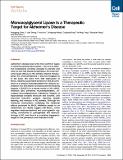| dc.contributor.author | Chen, Rongqing | |
| dc.contributor.author | Zhang, Jian | |
| dc.contributor.author | Wu, Yan | |
| dc.contributor.author | Wang, Dongqing | |
| dc.contributor.author | Feng, Guoping | |
| dc.contributor.author | Tang, Ya-Ping | |
| dc.contributor.author | Teng, Zhaoqian | |
| dc.contributor.author | Chen, Chu | |
| dc.date.accessioned | 2014-11-20T16:38:22Z | |
| dc.date.available | 2014-11-20T16:38:22Z | |
| dc.date.issued | 2012-11 | |
| dc.date.submitted | 2012-06 | |
| dc.identifier.issn | 22111247 | |
| dc.identifier.uri | http://hdl.handle.net/1721.1/91650 | |
| dc.description.abstract | Alzheimer's disease (AD) is the most common cause of dementia among older people. There are no effective medications currently available to prevent and treat AD and halt disease progression. Monoacylglycerol lipase (MAGL) is the primary enzyme metabolizing the endocannabinoid 2-arachidonoylglycerol in the brain. We show here that inactivation of MAGL robustly suppressed production and accumulation of β-amyloid (Aβ) associated with reduced expression of β-site amyloid precursor protein cleaving enzyme 1 (BACE1) in a mouse model of AD. MAGL inhibition also prevented neuroinflammation, decreased neurodegeneration, maintained integrity of hippocampal synaptic structure and function, and improved long-term synaptic plasticity, spatial learning, and memory in AD animals. Although the molecular mechanisms underlying the beneficial effects produced by MAGL inhibition remain to be determined, our results suggest that MAGL, which regulates endocannabinoid and prostaglandin signaling, contributes to pathogenesis and neuropathology of AD, and thus is a promising therapeutic target for the prevention and treatment of AD. | en_US |
| dc.description.sponsorship | National Institutes of Health (U.S.) (NIH grant R01NS076815) | en_US |
| dc.description.sponsorship | National Institutes of Health (U.S.) (NIH Grant R01NS054886) | en_US |
| dc.description.sponsorship | National Institutes of Health (U.S.) (NIH Grant R21AG039669) | en_US |
| dc.language.iso | en_US | |
| dc.publisher | Elsevier B.V. | en_US |
| dc.relation.isversionof | http://dx.doi.org/10.1016/j.celrep.2012.09.030 | en_US |
| dc.rights | Creative Commons Attribution | en_US |
| dc.rights.uri | http://creativecommons.org/licenses/by/3.0/ | en_US |
| dc.source | Elsevier | en_US |
| dc.title | Monoacylglycerol Lipase Is a Therapeutic Target for Alzheimer's Disease | en_US |
| dc.type | Article | en_US |
| dc.identifier.citation | Chen, Rongqing, Jian Zhang, Yan Wu, Dongqing Wang, Guoping Feng, Ya-Ping Tang, Zhaoqian Teng, and Chu Chen. “Monoacylglycerol Lipase Is a Therapeutic Target for Alzheimer’s Disease.” Cell Reports 2, no. 5 (November 2012): 1329–1339. | en_US |
| dc.contributor.department | Massachusetts Institute of Technology. Department of Brain and Cognitive Sciences | en_US |
| dc.contributor.department | McGovern Institute for Brain Research at MIT | en_US |
| dc.contributor.mitauthor | Wang, Dongqing | en_US |
| dc.contributor.mitauthor | Feng, Guoping | en_US |
| dc.relation.journal | Cell Reports | en_US |
| dc.eprint.version | Final published version | en_US |
| dc.type.uri | http://purl.org/eprint/type/JournalArticle | en_US |
| eprint.status | http://purl.org/eprint/status/PeerReviewed | en_US |
| dspace.orderedauthors | Chen, Rongqing; Zhang, Jian; Wu, Yan; Wang, Dongqing; Feng, Guoping; Tang, Ya-Ping; Teng, Zhaoqian; Chen, Chu | en_US |
| dc.identifier.orcid | https://orcid.org/0000-0002-8021-277X | |
| mit.license | PUBLISHER_CC | en_US |
| mit.metadata.status | Complete | |
